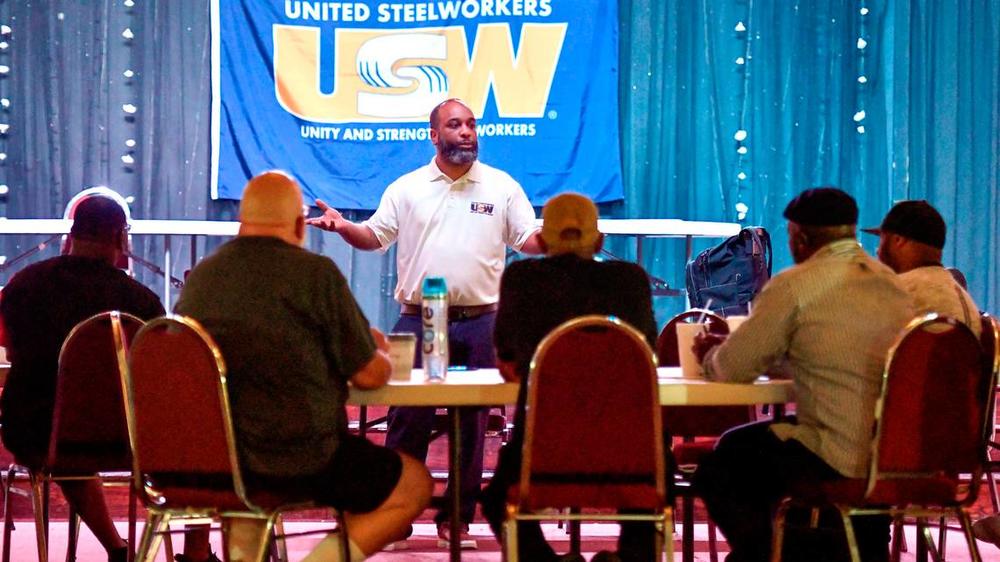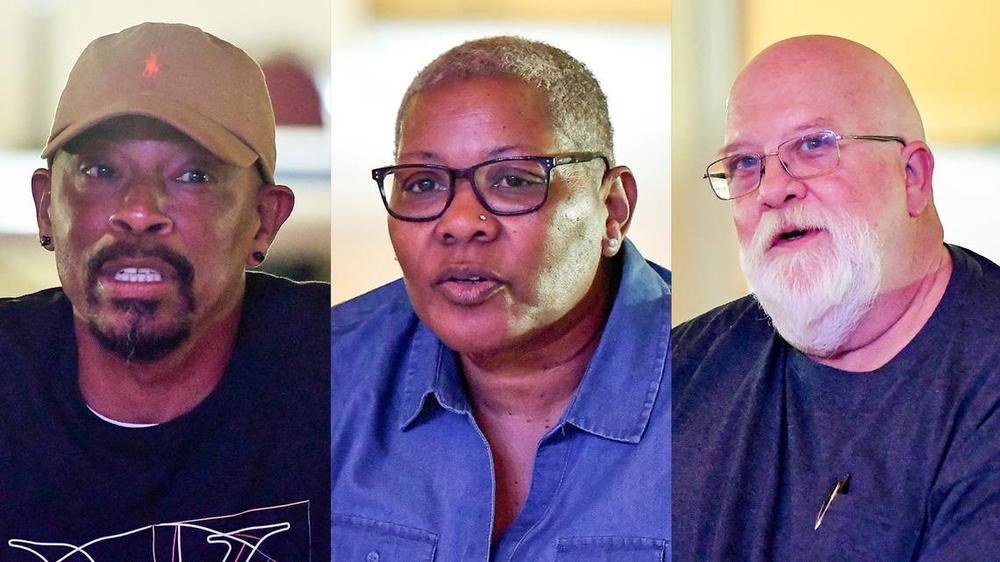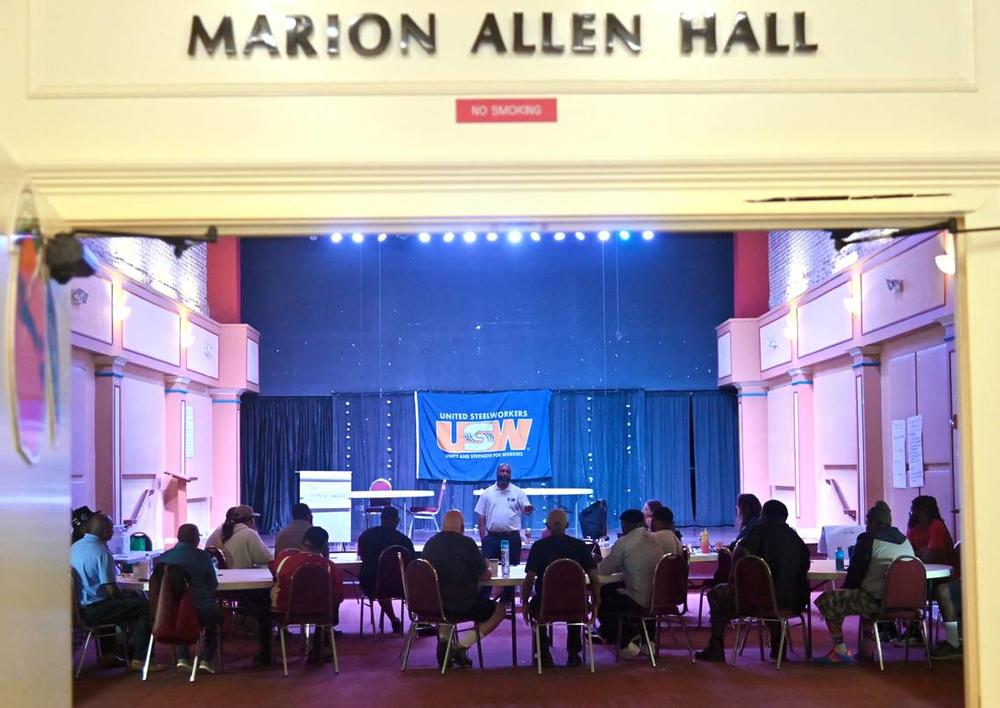
Caption
Alex Perkins, a staff representative with the United Steelworkers, speaks to Blue Bird employees during a training session for the bargaining committee in June.
Credit: Jason Vorhees / The Telegraph

Alex Perkins, a staff representative with the United Steelworkers, speaks to Blue Bird employees during a training session for the bargaining committee in June.
The newly formed union at electric school bus maker Blue Bird’s plant in Fort Valley held its first bargaining session with management on July 6, two months after workers voted to unionize with the United Steelworkers.
The two sides set ground rules for the upcoming negotiations, which could take several months or even years. Management agreed to set up a process to address worker complaints before reaching the first contract and also to let USW safety experts conduct a walk-through of the worksite.
The company recognized the union in May, after an election that was hailed at the time as a victory for the Biden administration’s efforts to encourage union membership at companies receiving industrial-policy subsidies.
Over the next five years, Blue Bird hopes to receive $1 billion in revenue from the EPA’s Clean School Bus Program, funded by the Bipartisan Infrastructure Law.
Blue Bird has complied with the bargaining procedure. But inside the plant, workers say they’ve faced a more hostile environment from managers since the vote, including modifications to company policy.

From left, Craig Corbin, Carolyn Allen and Tim Holderfield during a training session for the Blue Bird bargaining committee in June.
Workers told the Telegraph that, shortly after the vote, the company changed its rules for lunch breaks, effectively shortening them for employees who chose to leave the worksite.
Managers have ramped up disciplinary action against workers, and several workers have been fired, they said. As part of the crackdown on informal policies that bosses previously let slide, the company handed out new employee handbooks for the first time in years.
“It’s kind of like they’re trying to send a message that if you want to be a part of the union, this is how it’s going to be now,” said Craig Corbin, a worker on the floor at Blue Bird and a member of the bargaining committee.
In response, the Steelworkers sent a letter to Blue Bird in June outlining concerns from workers and requesting additional information. The union’s bargaining committee raised the issue to management during their first negotiating session but said they would only submit complaints to the National Labor Relations Board (NLRB), if necessary, once they conduct a further investigation.
Carolyn Allen, a worker elected by her colleagues to the union’s bargaining committee, said there has been a recent uptick in firings, and she chalked it up to retaliation for the union vote. Most workers the Telegraph interviewed had heard about the firings, and many shared Allen’s view that they were related to the union election.
By law, the company must notify the union of any disciplinary actions it takes against workers. But Blue Bird management has ignored this, union representatives say.
In a text to workers last month, the union said it had informed the company of this requirement, but management nevertheless “continues to issue discipline without notifying or bargaining with your union. We sent another letter to Blue Bird today demanding that they stop this unlawful behavior.”
In a statement, Blue Bird denied any charges of unlawful retaliation against workers since the union vote. Asked about the letter from the union, the company would not go into detail about the situation.
“We do not share such communications with parties outside the negotiating process. Instead, we will continue to negotiate honestly and fairly with the representatives of our employees,” the statement read.
Since winning the election, the unfair labor practice complaints have been withdrawn.
Pete Smalls, who works on the floor, didn’t vote during the election. But after the firings, he’s now joining the union for better pay and protection against retaliation.
“I’d never been around a union so I didn’t know what it’s all about but now I’m hoping it can deliver for us,” said Smalls.

Blue Bird employees fill The Austin Theatre in downtown Fort Valley for a training session for the bargaining committee in June.
The 697-435 union vote, with an 80% turnout among the plant’s predominantly Black workforce, was historic for a variety of reasons.
Georgia has the ninth-lowest unionization rate in the country, hovering just below 5%. The state is particularly difficult for organizing because of aggressive union-busting tactics by employers and right-to-work laws that make union dues voluntary, undercutting collective bargaining even if workers do manage to form a union.
The Steelworkers victory at Blue Bird achieved a goal sought by generations of the company’s workers, who have tried to unionize since the 1960s.
When he first started at the company in the early 1970s, Tim Holderfield, now an elected bargaining committee member, had heard stories about the prior drive with the Carpenters union that was crushed. During both unionization drives with the United Auto Workers in the 1980s and the early 2000s, Holderfield saw the same pattern play out: The company tried to scare workers by making an example out of a few organizers.
According to other workers, the company threatened to close up shop and move the plant if they unionized with the UAW.
When workers began talking about organizing with the Steelworkers in 2019, Holderfield figured he’d stay out of it. He’d seen what the company would do if you undercut their authority, and he was only a few years away from getting his retirement payout. The pandemic stalled the organizing as it became difficult to hold meetups outside of work.
Once the economy began to reopen, the Steelworkers sent organizers down to Fort Valley in 2021. They knocked on doors and started to build numbers. The movement gained traction, this time because of the workers’ experience at the plant during the pandemic.
As COVID cases spread throughout Georgia, Blue Bird remained open, and many workers felt they hadn’t been adequately compensated for keeping the shop running under strenuous health conditions.
“Post-pandemic, it just seemed like everyone was eager to organize,” said Alex Perkins, a longtime Macon-based Steelworkers staffer who’s now the representative for the Blue Bird local.
Coming out of the pandemic, workers faced erratic work schedules because of supply chain disruptions for mechanical parts. When parts came in, the Blue Bird staff often had to work overtime to complete orders in time. Another issue cited by workers who voted for the union was regular delays to holiday and bonus payments.
In this campaign, organizers got an assist from a legislative victory under the Biden administration.
In 2022, Blue Bird was awarded the first in a series of grants from the EPA’s Clean School Bus Program, which the company anticipates will bring in a billion dollars in revenue over the next five years, to scale up their electric school bus fleet.
The program was expanded by the bipartisan infrastructure law, and included a provision blocking any recipient of the EPA grant from directly using the grant money to bust unions.
The union neutrality provision was one of the major victories for labor from the set of Biden industrial policies. Though it doesn’t ban employers outright from running an anti-union campaign, the goal was to at least constrain the extent to which an employer under contract with the government could curtail collective bargaining, for example by using the grant funds to hire an outside anti-union law firm.
Enforcement of the rule, however, has proven more difficult because it poses an exceptionally high bar for prosecuting companies.
“Proving that a company explicitly used government funds for anti-union activities is nearly impossible to do,” said Madeline Janis, the co-founder and executive director of Jobs to Move America, which has organized state and local campaigns to push contractors into community benefit agreements, particularly around transportation
Asked by the EPA in a questionnaire recently sent to all the recipients of the Clean School Bus Program grants whether the company had “committed to remain neutral in any organizing campaign and/or to voluntarily recognize a union based on a show of majority support,” Blue Bird sidestepped the question about neutrality and simply said it was committed to voluntarily recognizing the newly formed union.
Asked by the Telegraph about the survey question, Blue Bird responded that it did not use EPA funds “in any way related to the United Steelworkers organizing campaign.” Regarding the seven unfair labor charges filed before the election, Blue Bird pointed to the complaints being “voluntarily dismissed” after the election. The complaints were withdrawn by workers.
“After winning the election, we didn’t want to prolong the process before getting to the negotiating table, and these types of ordeals can be needlessly drawn out,” Perkins said.
Neither the EPA nor any other government body ever intervened directly at the plant, but union organizers believe that Blue Bird softened its anti-union efforts because of the pressure organizers were able to exert on the company via the union neutrality condition in its contract.
“Compared to other companies we’ve had to deal with around this area, Blue Bird practically didn’t even have an anti-union campaign,” said Perkins.
Since the Steelworkers won the election at Blue Bird, the union has been focused on organizing its committee, electing representatives and setting strategy to begin bargaining.
For a union hall, the workers are using the Austin Theater, a refurbished former cinema on Main Street in Fort Valley’s downtown strip. Inside, the elections for the bargaining committee were illuminated by purple stage lights, which cast the proceedings in an evocatively dramatic glow alongside the faded grandeur of the theater’s red carpeting and exposed brick walls.
This backdrop set the stage for the high-stakes balancing act the union will have to strike in its first contract. In a right-to-work state, the 435 workers who voted “no” become a contested battleground, both for the union to persuade and for management to try and pit against the union.
“There’s a lot riding on this first contract,” Perkins said.
This story comes to GPB through a reporting partnership with The Telegraph.